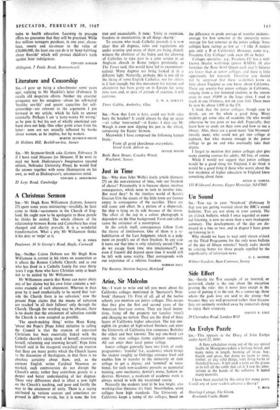Just in Time
SIR,—Why does John Wells's lively article (January 27) on the non-existence of time, rule out freedom of choice? Presumably it is because choice involves consequences, which seem in turn to involve time. But need they? In the timeless world of Keats's Grecian Urn the streets of the little town are forever empty in consequence of the sacrifice. There are still cause and effect. In a picture of a shipwreck, the ship is lying on its side because of the storm. The effect of the red in a colour photograph is dependent on the blue background. Form and colour cause the existence of a masterpiece.
In the article itself, consequences follow from the theory of timelessness. One of them is a re- habilitation of the Last Judgment, which is a judg- ment on people's use of their freedom. In any case it turns out that time is only relatively unreal ('How do we escape from time into timelessness?'), so even if freewill did depend upon time it would still be left with some reality. That corresponds with our experience of a relative freedom.
NORMAN HALE
The Rectory, Stretlon Sugwas, Hereford


































 Previous page
Previous page